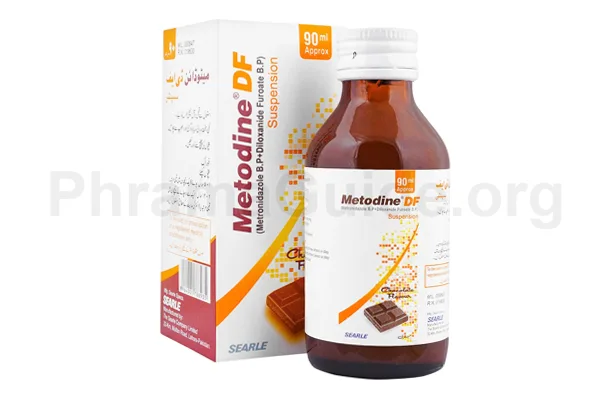Metodine DF syrup is a combination medication that is used for specific indications related to gastrointestinal disorders. It provides prokinetic and anti-parasite effects, that help to treat the following conditions:
- Gastroesophageal Reflux Disease (GERD): Metodine DF Syrup can be used to manage the symptoms of GERD, including heartburn, regurgitation, and difficulty swallowing. It works by enhancing the movement of the stomach and reducing the reflux of stomach acid into the esophagus.
- Gastroparesis: Gastroparesis is a condition characterized by delayed stomach emptying. Metodine DF Syrup is often used to improve gastric motility and emptying, helping to alleviate symptoms such as nausea, vomiting, bloating, and early satiety.
- Nausea and Vomiting: Metodine DF Syrup is commonly used to treat nausea and vomiting associated with various causes, such as chemotherapy, postoperative recovery, migraines, and certain gastrointestinal disorders.
- Diabetic Gastroparesis: Metodine DF Syrup can be used to manage symptoms of gastroparesis in individuals with diabetes. It helps improve stomach motility and reduce symptoms such as nausea, vomiting, and bloating.
- Amoebic Dysentery: The use of Metodine DF syrup helps in the eradication of Entamoeba histolytica in the intestinal lumen after acute amoebic dysentery treatment. It helps prevent the recurrence of the infection and eliminates the remaining amoebae in the intestine.
Off-label Uses of Metodine DF Syrup
- Migraine Headaches: Metodine DF Syrup may be used off-label for the treatment of migraine headaches, particularly for its antiemetic properties in relieving associated nausea and vomiting.
- Cyclic Vomiting Syndrome: Cyclic vomiting syndrome is a disorder characterized by recurrent episodes of severe vomiting. Metodine DF Syrup may be used off-label to help manage symptoms during these episodes.
- Hiccups: In certain cases, Metodine DF Syrup may be used off-label for the treatment of persistent or intractable hiccups.

What is Metodine DF?
Metodine DF Syrup is one of the leading brands with the combination of Metoclopramide and Diloxanide, manufactured and marketed by Searle Pakistan (Pvt) Ltd.
Metodine DF Alternatives : Other Similar Brands
The following are some alternative brands of Metodine DF and their manufacturers.
- Flagyl Plus : Sanofi Aventis (Pakistan) Ltd.
- Zolen : Sami Pharmaceuticals (Pvt) Ltd, Pakistan.
- Entamizole : Abbott Laboratories Pakistan (Pvt) Ltd.
- Entametox : Epla Laboratories (Pvt) Ltd, Pakistan.
- Zolodine : Ideal Pharmaceutical Industries, Pakistan.
- G Zole ; Olive Laboratories, Pakistan.
- Diloxamet : Mediceena Pharma (Pvt) Ltd, Pakistan.
- Loxon : Bloom Pharmaceuticals (Pvt) Ltd, Pakistan.
- Amebazole : Geofman Pharmaceuticals, Pakistan.
- Metrolox : Medicraft Pharmaceuticals (Pvt) Ltd, Pakistan.
Metodine DF : Available Formulations and Strengths
Presently, Metodine is available in syrup form.
Metodine DF syrup each 5ml contains:
- Metoclopramide: 100mg
- Diloxanide (Furoate): 125mg
Metodine (Plain) syrup each 5ml contains:
- Metoclopramide: 200mg
- Diiodohydroxyquinoline: 200mg
Who Should Not Use Metodine DF?
Metodine DF syrup, like any medication, has certain contraindications. Contraindications are specific situations or conditions in which the use of Metodine DF is not recommended or should be avoided.
Here are some contraindications for its ingredients:
- Metoclopramide contraindications:
- Gastrointestinal obstruction or perforation: Metoclopramide should not be used in individuals with gastrointestinal obstruction or perforation as it may further worsen the condition.
- History of gastrointestinal bleeding: If a person has a history of gastrointestinal bleeding, metoclopramide should be used with caution or avoided as it may increase the risk of bleeding.
- Pheochromocytoma: Metoclopramide is contraindicated in individuals with pheochromocytoma, a type of adrenal gland tumor, as it can potentially cause a dangerous increase in blood pressure.
- Seizure disorders: Metoclopramide may lower the seizure threshold, so it should be used with caution in individuals with a history of seizure disorders.
- Diloxanide contraindications:
- Hypersensitivity: Diloxanide should not be used in individuals who have a known hypersensitivity or allergic reaction to the medication.
- Severe hepatic impairment: Diloxanide is primarily metabolized in the liver, so it should be used with caution or avoided in individuals with severe liver impairment.
- Pregnancy and breast-feeding: The safety of diloxanide during pregnancy and breastfeeding has not been established, and therefore its use should be avoided unless the potential benefits outweigh the risks and under the guidance of a healthcare professional.
Recommended Daily Dosage of Metodine DF
Metodine DF Syrup Dose for Adults:
- 10 ml (2 teaspoons) three times a day for 10 days.
Metodine DF Syrup Dose for Children:
- 2.5 ml (½ teaspoon) three times a day for 10 days.
How Metodine DF Works?
Metodine DF syrup has different modes of action:
Metoclopramide: Metoclopramide primarily acts as a prokinetic agent and an antiemetic. Its mode of action involves several mechanisms:
- Dopamine antagonist: Metoclopramide blocks dopamine receptors in the chemoreceptor trigger zone (CTZ) of the brain, which helps to prevent nausea and vomiting signals from being transmitted.
- Serotonin antagonist: It also has antagonistic effects on serotonin (5-HT3) receptors in the CTZ, further contributing to its antiemetic properties.
- Prokinetic effects: Metoclopramide enhances the movement (motility) of the gastrointestinal tract by stimulating the muscles in the upper digestive system, including the stomach and small intestine. This helps to improve gastric emptying and enhance the coordination of contractions, aiding in the movement of food through the digestive system.
Overall, metoclopramide’s combined actions as a dopamine antagonist, serotonin antagonist, and prokinetic agent make it effective in relieving symptoms associated with gastroparesis, GERD, and nausea/vomiting.
Diloxanide: Diloxanide is an antiprotozoal medication primarily used for the treatment of amoebiasis, an infection caused by the parasite Entamoeba histolytica. Its mode of action involves the following:
- Antiprotozoal activity: Diloxanide works by inhibiting the growth and replication of the Entamoeba histolytica parasite. It acts specifically on the trophozoite form of the parasite, which is responsible for causing intestinal infections.
- Local action in the intestine: Diloxanide remains largely concentrated in the intestine, where it exerts its antiprotozoal effects. It is minimally absorbed into the bloodstream, limiting its systemic activity.

Leave A Comment